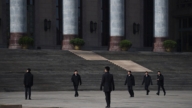【新唐人2014年07月01日讯】南中国海一些产量最大的油气矿藏,位于马来西亚沙巴州和沙捞越附近海域。日前,一家国际能源财团宣布在马来西亚海岸附近发现了天然气资源,中共没有做出任何回应,而马来西亚多年来也一直在南海开采石油,中共也没有做出任何抗议。外界认为,这种“平静”,与中共和越南前一阵子的南海领土摩擦,形成了鲜明的对比。中共的态度差异为什么如此之大,下面我们一起看看。
据美国《华尔街日报》报导,目前在中国主张主权的南中国海,至少有九个油气区块处于开发阶段,预计将在两年内投产。这些石油开采投资者,包括荷兰皇家“壳牌有限公司”(Royal Dutch Shell PLC, RDSB.LN)、和总部设在美国的“墨菲石油公司”(Murphy Oil Corp),以及“康菲石油公司”(ConocoPhillips, COP)。
6月22号,一家国际能源财团公布在马来西亚海岸附近发现了天然气资源,这一区域距离马来西亚沙捞越海岸约144公里,恰好处于中国声明主权的水域之内。而“墨菲石油公司”表示,他们从1999年开始,就在这个区域勘探。同时,多年来,马来西亚也支持在这个地区进行大规模油气开发。根据美国能源情报署的信息,马来西亚多数天然气田产量来自这个区域。
《华尔街日报》评论说,北京没有对这些石油开采行为做出公开抗议,这种平静与往北1,000公里水域上的中、越主权争端,形成了鲜明对比。
美国《中国事务》杂志总编辑伍凡:“是不是意味它(中共)默认了,那是你的东西,不是我的。”
时政评论员蓝述:“跟越南打起来,它不会冒跟美国对立的危险,另外它也不怕越南,其他东盟国家还有其他亚太国家,你和人家闹的冲突越厉害,人家就跟美国走的更近,选一个越南转移视线也就罢了,它绝对不可能跟所有的这些国家都闹对立的。”
今年初,中共在中、越都声称拥有主权的水域,部署了一个钻井平台,5月初以来,中、越两国的海警船与渔船一直冲突不断,越南人还焚毁了大量中国在越南的工厂。另外,据中国海事局消息,6月13号起,中国三个钻井平台将在南海进行钻井作业。
蓝述:“不解决争端的话,你那个石油是拿不回去的,石油是个易燃易爆物质,那个钻井平台在海上就是个固定的靶子,什么时候都可能被人家打的,如果真想要石油的话,共同开发是个最好的办法,它之所以这样闹,它实际上不是真正的想要石油,它要的是一个争端,利用这个争端去做文章,解决国内矛盾。”
除了越南之外,菲律宾与中国之间的主权争议也正在日趋升温,而在东中国海,中、日两国战斗机和武装舰船,也频繁发生对峙。去年9月,中、日在东海钓鱼岛附近撞船,激发了两国主权纠纷后,中国宣布将把钓鱼岛附近海域的巡逻常态化,战斗机和大型轰炸机不断飞临中、日中间线附近,和钓鱼岛附近海域。
蓝述:“一个是为国内的矛盾转移视线,另外高层争夺对军队的控制权,大家都在讨好鹰派,所以出现了在南海,在日本这些纠纷,但是这些纠纷,它要选那些能够挑起民族矛盾和民族仇恨的,比如日本它有侵华的历史,这个民族仇恨很容易挑起来的。”
目前,越南和菲律宾等国家,正在寻求向北京发出更为强硬的联合回应。以前一直站在中共一方的中国亲密盟友柬埔寨也在发生变化。柬埔寨国防部人事局副局长乔萨帕中将一行,6月24号访问了越南。乔萨帕表示,支持越南反对中国在越南海域非法架设钻井平台等“不法行为”的做法与立场。
《华尔街日报》引述新加坡东南亚研究所(Institute of Southeast Asian Studies)高级研究员斯托里(Ian Storey)的话表示,面对中共一直在提升马来西亚附近的军事存在,马来西亚可能将不得不重新调整南中国海政策。他还补充说,也许马来西亚应该尽早对中国采取更强硬的立场。
采访编辑/刘惠 后制/钟元
Why Is China Silent On The South China Sea Oil Drilling?
“Some of the South China Sea’s most productive oil and gas
deposits are off the coast of the states Sabah and Sarawak
on Malaysia’s side of Borneo," reported
the Wall Street Journal.
An international energy consortium recently announced
the discovery of natural-gas off Malaysia’s coast.
China issued no public objections regarding
the announcement.
China has also been quiet over the years regarding extensive
Malaysian-sponsored oil-and-gas exploration and production
in the overlapping South China Sea territory.
This low profile stance on overlapping claims is in contrast
to the confrontation between China and Vietnam.
Why is there such a huge difference? Let’s take a look.
The Wall Street Journal reported that, “at least nine
oil-and-gas blocks are now under development and expected
to start pumping within two years.
Investors include Royal Dutch Shell, U.S.-based Murphy Oil
Corp. and ConocoPhillips."
An international energy consortium announced on June 22
a natural-gas discovery around 144 kilometers, or 90 miles,
off the coast of Malaysia’s state of Sarawak,
inside waters where China previously has asserted claims.
Murphy Oil said it had explored in the area since 1999.
Malaysia has also supported oil exploitation in the area.
The area is the origin of most of Malaysia’s natural-gas
production, according to the U.S. government Energy
Information Administration.
WSJ commented that, “the lack of confrontation is in contrast
with the jousting 1,000 kilometers to the north between China
and Vietnam, where coast-guard and fishing vessels
have faced off since early May."
Chris Wu, China Affairs magazine editor in chief:
“Does it mean the Chinese Communist Party (CCP)
acknowledges the announcement?"
Commentator Lan Su: “It will not risk confronting the U.S.
by engaging in a battle with Vietnam.
It does not care about Vietnam either.
The more conflict there is with other ASEAN countries
as well as other Asia-Pacific countries, the more
these countries will get closer to the US.
Vietnam was chosen to divert attention. That was it.
It will not oppose the rest of these countries."
Earlier this year, the CCP deployed a rig in an area claimed
both by both China and Vietnam.
Since early May, coast-guard and fishing vessels
between both countries have faced off, domestic protests
resulting in destruction of Chinese owned factories
by rioters in Vietnam.
Meanwhile, China Maritime Safety Administration announced
three drilling rigs in the South China Sea will begin
operating on June 13.
Lan Su: “The dispute must be resolved, otherwise the oil will
not leave. The oil is flammable, and the rigs are fixed targets
which can be destroyed at anytime.
Joint development is the best way to retrieve the oil.
The CCP engages in conflict with a purpose.
It can be used to resolve its domestic conflicts."
Furthermore, “sparring over rival claims by the Philippines
and Chinais becoming increasingly heated, while in the East
China Sea, Chinese and Japanese fighter planes and armed
vessels frequently circle each other in asserting overlapping
claims," wrote WSJ.
Last September, collision near the Diaoyu Islands inspired
the sovereignty dispute between the two countries after China
announced that it would routinely patrol the waters
near the Diaoyu Islands, with fighter planes and bombers
in the disputed area.
Lan Su: “It is to divert domestic conflicts, and to please
the hawks for control of the armed forces.
That is the reason why there is conflict
in the South China Sea and with Japan.
The conflict has to be able to provoke ethnic conflicts
and ethnic hatred.
With the evasion history of Japan to China,
the ethnic hatred is easy to manipulate."
“Individual nations, such as Vietnam and the Philippines,
have sought a tougher collective response to Beijing.
Meanwhile, Cambodia—a close ally of China—has sided
with Beijing in previous Asean discussions on the disputes,"
said the WSJ article.
In his recent visit to Hanoi, Lieutenant General Khieu Saphat,
Deputy Director of the Personnel Department
of the Cambodian Ministry of National Defense, expressed
his support for Vietnam by objecting to China’s unlawful
actions in the East Sea.
WSJ quoted Ian Storey, senior fellow at the Singapore-based
Institute of Southeast Asian Studies, “Malaysia may have
to recalibrate its South China Sea policy."
He added, “Perhaps sooner rather than later Malaysia
may have to take a tougher line against Beijing."
Interview & Edit/Liu Hui Post-Production/Zhong Yuan

























